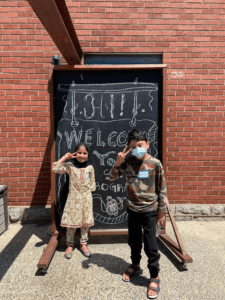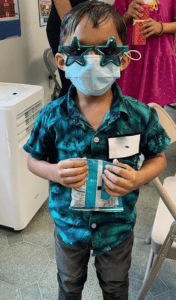Weekly Wins Round-Up: August 2022
Dear Friend,
I was delighted to meet so many of you at our Open House a few weeks ago. After two long years, we finally were able to open our doors and welcome the community into our new office space on Independence Mall. Staff enjoyed giving tours, sharing what they do, and answering some of your questions. Many discussed the challenges of finding housing for a family, enrolling young refugees in school, or filing a special petition for an unaccompanied minor.
Our Open House coincided with the one-year anniversary of the fall of Kabul, Afghanistan.
As we all know, one year ago the world watched in horror as Kabul fell to the Taliban and men, women and children fled to the airport to escape violence and persecution from their new government. Resettlement agencies all over the country had to mobilize quickly in light of the emergency and we were no exception.
Normally, we are given ten days notice before an arrival to give us time to find housing and get things ready.
This time we were told, “you will get one or two hours’ notice.”
Normally, we are provided with the opportunity to turn down a case—something we rarely do but sometimes must because of capacity or other issues.
This time we were told, “you must take every single case.”
Normally, a refugee arrives—tired, anxious, and a little traumatized, to be sure, but—after having spent months or even years, waiting for their clearances and approvals to be completed and processing the trauma that uprooted them from their country of origin, they are ready to begin their lives anew in the US.
This time, we met people at the airport who were reeling from the shock of what had just happened to them. Literally overnight they lost their homes, their countries and their entire way of life. Many, many, many were separated from family members who didn’t make it out.
HIAS Pennsylvania, for the entire fall and winter of 2021 and 2022, had an “all hands on deck” response. Board members, lawyers, administrative staff, volunteers—all came together to ensure that our refugee resettlement program staff had the support they needed and that every single arrival was met on time at the airport and brought to a safe location, fed a hot meal, and given a hug or firm handshake of understanding and compassion. Then the work of resettlement began in earnest—obtaining social security cards, medical treatment, finding permanent housing, enrolling kids in school, orienting the families to their new city, providing a cultural orientation, opening up bank accounts, getting work authorization, and helping the families become financially independent.
Once that work was complete, the families were handed off to our lawyers for representation. Although in common parlance, these Afghans are called “refugees,” there wasn’t time to provide them with this legal status. Instead, they were provided with temporary permission to be in the United States. For them to be able to remain safely here, they need to file for asylum or other relief for which they might be eligible. And that requires navigation of our complex immigration system. Staff attorneys and pro bono attorneys alike stepped up to the plate and took on these cases, and many more still need to be filed.
So much work was done, so much collaboration, so many success stories: from a self-dubbed “little village” Afghan community in a South Philadelphia apartment building, to a thriving Afghan community in Northeast Philadelphia. One of our clients recently sat down to tell his story of resettlement. Watch this recent interview with Noorulhaq Hadi, a HIAS PA client who was one of those Afghans who had to rush to the airport with only a moment’s notice. He speaks about the adjustment to American living, whether he plans to stay, and what he thinks about Rita’s water ice! We are proud and humbled by the work and your support. But there is still so much more to be done.
There are so many family members left behind—in danger, in hiding. A potential legal remedy for those relatives—humanitarian parole—hasn’t worked because United States Citizenship and Immigration Services has denied and continues to deny thousands and thousands of these petitions. They argue that the threats described aren’t specific enough to warrant the need for protection or they argue that there isn’t sufficient proof that the subject of the application for humanitarian parole isn’t actually in danger, despite being a family member of someone who worked for the American military. Denial after unconscionable denial rolls in as Afghans left behind are shot, assaulted, or prevented from going out to get food or water.
And the asylum petitions we continue to file require hours and hours of legal expertise despite the fact that the entire world saw what happened in Afghanistan and knows about the persecution occurring there. The Afghan Adjustment Act, if passed, would, with the stroke of a pen, eliminate the need for hours and hours of repetitive argument and review. Afghans could legally put this entire experience behind them and begin in earnest building their lives in the US. But while Congress slowly ponders what should be an easy task with no downside, Afghans that are here remain in a temporary status, forced to file for asylum, reliving the trauma that brought them here, explaining to our own government why the Taliban’s takeover—an event that we tried to prevent for twenty years—meant that they could no longer live in the place they called home.
So, we can celebrate together the critical welcoming work we did and pledge to keep it going by advocating for those that have been left behind and for passage of the Afghan Adjustment Act.
A month before Kabul fell, Haitians were also fleeing from terrible circumstances—a government coup and another large earthquake. Unlike others seeking help, many Haitians aren’t eligible for the same pathway to citizenship, and have instead been forced into the cycle of Temporary Protected Status (TPS), which is, as its name implies, temporary, and must be renewed every 18 months. With that in mind, we’ve created the Haitian Immigrant Relief Program, which provides direct case management support to Haitians, providing referrals to our legal services and to social services available in the community, and we’ve also been organizing and hosting legal clinics and Know Your Rights presentations. So much more work needs to be done for this community as well—starting with developing permanent forms of relief for Haitians.
And, of course, just when we thought we could catch our breaths, Putin invaded Ukraine and millions were forced to flee. Once again, our staff, Board, and volunteers stand ready to help and are working in collaboration with the city, the state, the other resettlement agencies and nonprofits to provide support for Ukrainians. But there is, unfortunately, still more work to be done because Ukrainians were not provided with legal refugee status but were only partially given benefits by Congress that will help them settle in here. Legal status dictates the support that we can provide, the benefits that people can receive, and the stability that people feel. Ukrainians were given a temporary status that permits them some benefits but not all and ultimately is very confusing to navigate. It is also a status that does not permit them to petition for family members left behind.
As I reflect on this past year, I am humbled by the extraordinary outpouring of support we received from all of you during this extremely challenging year with three major crises. You and your donations, volunteering, and in-kind support, have been integral to ensuring that all who came were welcomed. We could not have done it without you.
We look forward to continuing to partner with you—engaging in the critical work of welcome and advocating for just, equitable, and common sense immigration policies. Please join me in celebrating our successes you helped to make possible!
“It’s very nice to feel free.”
One of my clients, an Afghan girl, suddenly had to leave the youth shelter where she was living because her age wasn’t clear from her documents. She knew no one in the US, and was really frightened. HIAS PA was tasked with resettling her, and within a couple of days, Community Resettlement Coordinator Roger Cheng found an incredible volunteer host family who agreed to take her in. After 9 months in a restrictive environment, she finally can do things she loves, like draw, paint, and cook (she wasn’t allowed to have pens, pencils or art supplies in her shelter room). She said, “it’s very nice here because I can be who I am. It’s very nice to feel free.”
-Mary McCabe, Detained Children’s Supervising Attorney
Legal advocacy makes youth client’s college dreams a reality!
The Philadelphia Inquirer recently published an article featuring one of my clients who went from homelessness to beginning college at LaSalle in the fall. College is too often out of reach for youth clients due to many of the reasons highlighted in the article. So when students like Jose excel it’s a huge win! While the article fails to mention HIAS PA, lots of legal advocacy has gone on behind the scenes to help make Jose’s college dreams possible. To read the full article click HERE.
-Stephanie Lubert, Immigrant Youth Advocacy Managing Attorney
Summer programming brings newcomer children together!
This week was our last week of PreK-8 summer programming for newcomer children, and it was hard to say goodbye to such a great summer. With two in-person sites (our first since 2019) and one virtual site, we reached over 60 students from Philadelphia-area refugee resettlement organizations, several of whom haven’t even started school yet in the US. I can’t say enough about our team and their impact on our students and families. Our English and Art instructors, our program assistants, and our team of volunteers were able to reach students on individual levels to support their growth.
One volunteer on our virtual team summed things up really well by reminding me how “It’s Good to Be Together” was the opening song for each school day. It got me thinking how important it was for these children who were pulled from the only worlds they had ever known to be together with others like them, all trying to make a new world for themselves in America. Indeed, it was so good to be together this summer.
Also, one of our students, a Rohingya speaker, is the only non-Afghan student at the South Philly site, and the team has talked about how all of the other students have worked hard to make sure he feels included.
-Valeri Harteg, Education Program Manager
Thank you for your continued support of HIAS Pennsylvania. I hope that these wins from HIAS PA staff give you a lift, as they do me. Look out for more wins at the beginning of next month!
In health,
Cathryn Miller-Wilson
Executive Director







